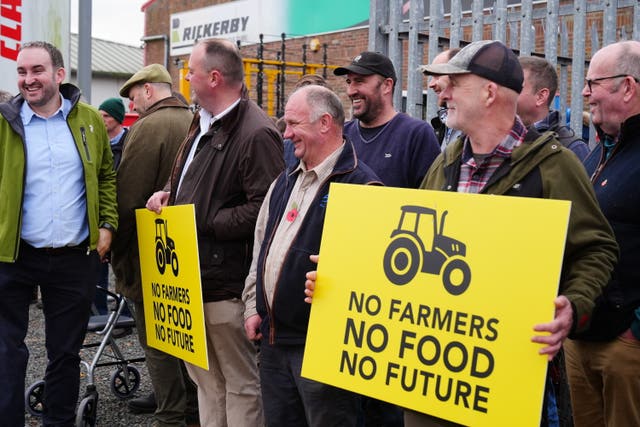Keir Starmer: Vast majority of farmers will not be hit by inheritance tax change
Treasury data shows that around three-quarters of farmers will pay nothing in inheritance tax as a result of the controversial changes.

Sir Keir Starmer has said he is “absolutely confident” that the “vast majority of farms and farmers” will not be affected by changes to inheritance tax announced in the Budget.
The row over the taxes for farms worth more than £1 million has rumbled on as the Prime Minister said on Sunday that the money the Government has put into the sector is “not to be overlooked”.
A protest is expected in Westminster on Tuesday as farmers rally on Whitehall against the changes announced in last month’s Budget, while separately the National Farmers’ Union will hold a mass lobby of MPs in their efforts to get the Government to rethink.
Speaking to reporters on the way to the G20 summit in Brazil, Sir Keir said “it is very important that we support farmers” but he is “confident” most will not be affected by the changes.

Asked whether he accepted that farmers feel betrayed, the Prime Minister said: “I think it is very important that we support farmers. That’s why we’ve put £5bn in the Budget for the next two years into farming.
“That is not to be overlooked”, he said, and also pointed to other cash that has been set aside in relation to flooding and disease outbreaks.
He added: “Obviously, there’s an issue around inheritance tax and I do understand the concern.
“But for a typical case, which is parents with a farm they want to pass on to one of their children, by the time you’ve taken into account not only the exemption for the farm property itself, but also the exemption for spouse to spouse, then parent to child, it’s £3 million before any inheritance tax will be payable.
“That’s why I am absolutely confident the vast majority of farms and farmers will not be affected by this.”
The rally on Tuesday will hear from celebrities and farming leaders while a procession to Parliament Square will be spearheaded by children on toy tractors. Organisers have told those coming that they should not bring their farm machinery.
On Sunday, the head of the farming union said that farmers are feeling “betrayed” about the changes to inheritance tax.
National Farmers’ Union president Tom Bradshaw told Sky News: “I think the industry is feeling betrayed, feeling angry.”
He added: “We have a Government saying food security is a critical part of national security, yet they’ve ripped the rug out from that very industry which is going to invest in food security for the future.”
Farmers have reacted with anger and dismay over the inheritance tax changes for farming businesses, which limit the 100% relief for farms to only the first £1 million of combined agricultural and business property.
For anything above that, landowners will pay a 20% tax rate, rather than the standard 40% rate of inheritance tax (IHT) applied to other land and property.
Treasury data shows that around three-quarters of farmers will pay nothing in inheritance tax as a result of the controversial changes.
However, farmers have challenged the figures, pointing instead to data from the Department for Environment, Food and Rural Affairs which suggests 66% of farm businesses are worth more than the £1 million threshold at which inheritance tax will now need to be paid.
Baroness Mallalieu, a Labour peer and the president of the Countryside Alliance, has said the changes “smell of incompetence”.
She told BBC Radio 4’s Westminster Hour: “There was no impact assessment done. The figures differ between the Treasury and Defra, and certainly differ from those of the NFU.
“But I hope what they will do is look at it very carefully, and just see what the unintended consequences were.
“If they wanted to deal with people who buy farmland not intending to farm themselves but to avoid tax, then fair enough to bring them within the tax threshold.
“But what they’ve done is to bring in a lot of people who they never really contemplated or thought of as being involved. And it’s really small farms,” she said.
She said the Government could make changes to the policy without a U-turn.
“It could be done by looking at the whole thing properly, just seeing how it works, raising the threshold or maybe giving it a longer run-in… this does smell of incompetence, it’s very, very depressing.”





